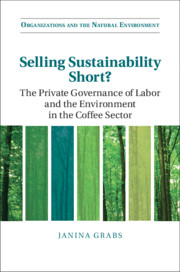 Selling Sustainability Short?
Selling Sustainability Short? Book contents
- Selling Sustainability Short?
- Organizations and the Natural Environment
- Selling Sustainability Short?
- Copyright page
- Contents
- Figures
- Tables
- Acknowledgments
- 1 Introduction
- 2 The Dilemma of Effective Private Governance
- 3 Defining the Goal of a Sustainable Coffee Sector
- 4 Changing the Market
- 5 Changing Farming Practices
- 6 Designing Effective Private Institutions
- 7 Interacting with Public Institutions
- 8 Conclusions
- Book part
- References
- Index
6 - Designing Effective Private Institutions
Published online by Cambridge University Press: 28 April 2020
- Selling Sustainability Short?
- Organizations and the Natural Environment
- Selling Sustainability Short?
- Copyright page
- Contents
- Figures
- Tables
- Acknowledgments
- 1 Introduction
- 2 The Dilemma of Effective Private Governance
- 3 Defining the Goal of a Sustainable Coffee Sector
- 4 Changing the Market
- 5 Changing Farming Practices
- 6 Designing Effective Private Institutions
- 7 Interacting with Public Institutions
- 8 Conclusions
- Book part
- References
- Index
Summary
Chapter 6 compares the outcome additionality of thirty-two indicators in a quantitative meta-analysis, and tests hypotheses derived from an inductive theoretical analysis of micro-institutional dynamics. It examines the comparative impact of regulatory clarity and stringency; effective training and capacity building; the existence of significant, individualized price premiums; the presence of investment and opportunity costs; restrictive auditor oversight policies; and the coexistence of public regulation on the likelihood that a requirement will show outcome additionality in matched farmers. The results show that regulatory clarity and stringency, along with the provision of substantive price premiums, have the most significant positive correlation with outcome additionality (i.e., likely behavior changes); while the coexistence of public regulations and the existence of high opportunity costs has a significant negative impact. These results are striking, as the majority of standards are currently moving away from a stringent regulatory approach. However, this approach is unlikely to allow for the creation of price premiums that could compensate farmers for high-cost practices.
Keywords
- Type
- Chapter
- Information
- Selling Sustainability Short?The Private Governance of Labor and the Environment in the Coffee Sector, pp. 186 - 226Publisher: Cambridge University PressPrint publication year: 2020
